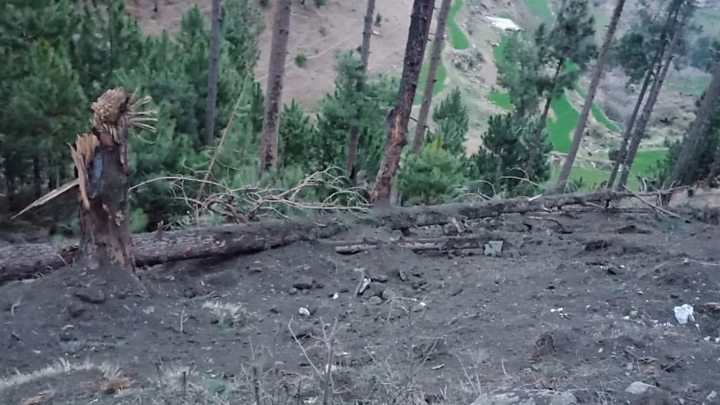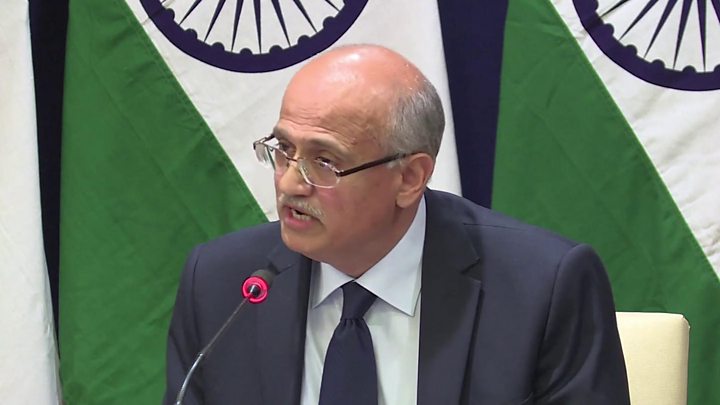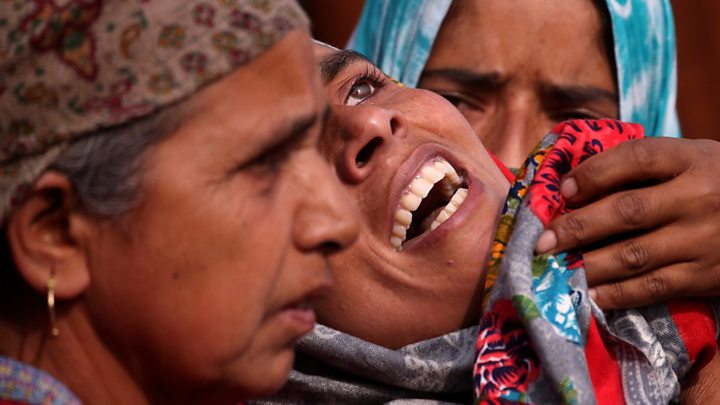
Pakistan says it will respond “at the time and place of its choosing” after India launched strikes against militants in Pakistani territory.
India said it had killed a large number of militants but Pakistan called the claim “reckless”.
Tensions between the nuclear-armed neighbours have been high following an attack on Indian troops in Kashmir.
The attack was claimed by a group based in Pakistan, Jaish-e-Mohammad (JeM), and India had vowed to retaliate.
India accuses Pakistan of allowing militant groups to operate on its territory, something Pakistan denies.
- Viewpoint: India strikes in Pakistan a major escalation
- What is militant group Jaish-e-Mohammad?
- Why India and Pakistan dispute Kashmir
Both India and Pakistan claim all of Muslim-majority Kashmir, but control only parts of it. The two have fought three wars and a limited conflict since independence from Britain in 1947 – and all but one were over Kashmir.
The strikes are the first launched across the line of control – the de facto border that divides India-administered Kashmir from Pakistan-administered Kashmir – since a war between the two countries in 1971.
What happened?
The two sides have given different versions of events. Indian officials said the strikes hit a camp in Balakot, in north-west Pakistan.
Indian Foreign Secretary Vijay Gokhale said a “large number” of militants were killed, defending the raids as a “pre-emptive strike” to stop further JeM attacks.

Residents in Balakot told the BBC they were woken by loud explosions but there has been no confirmation of casualties.
The Pakistani army denied there were any casualties. It said its jets forced Indian planes to withdraw and drop their “payload” in an sparsely inhabited area.
What has the response been?
Pakistan’s Foreign Minister Shah Mahmood Qureshi said India had “resorted to a self-serving, reckless and fictitious claim”, pointing to elections due in India in May.
A meeting of Pakistan’s National Security Committee, which includes Prime Minister Imran Khan, ended with a warning Pakistan would “respond at the time and place of its choosing”.
Image copyright
EPA
There have been celebrations in Indian following news of the operation
Indian Prime Minister Narendra Modi did not directly mention the air strikes when he addressed a political rally in Rajasthan on Tuesday but he told crowds: “I understand your enthusiasm and your energy. Today is a day we bow before our heroes.”
Amid fears of escalation, the European Union urged “maximum restraint” from both sides, with China making a similar plea.
Tensions reach a dangerous level
Analysis by M Ilyas Khan, BBC News, Islamabad
The Indian air strikes that hit a target inside Pakistani territory have taken tensions to a dangerous level.
In September 2016, an attack on an Indian army base in Uri created a similar situation when Delhi decided to respond with so-called “surgical strikes”.
India’s claims that they airdropped special forces to destroy militant camps on the Pakistani side of Kashmir were found to be largely exaggerated, but Indian troops did cross at several points along the Line of Control (LoC), inflicting some casualties on Pakistani forces.
This time they have hit a target across the international border, inside Pakistani territory, at a location where a training camp of Kashmiri militants is known to have existed for several years.
Pakistan’s military has cordoned off the area and not even the local police are allowed in, so it will be some time before details of the attack become known.
Also, Pakistani officials have been underplaying the severity of the incident by describing it as a strike “across the LoC”, not one across the international border.
Pakistan has vowed to respond but this may not go beyond diplomatic measures. However, as some observers point out, there may be punitive attacks by militants against Indian forces in Kashmir “at an appropriate time”.
Timeline of India-Pakistan tensions

October 1947: First war between India and Pakistan over Kashmir just two months after they become independent nations.
August 1965: The neighbours fight another brief war over Kashmir.
December 1971: India supports East Pakistan’s bid to become independent. The Indian air force conducts bombing raids inside Pakistan. The war ends with the creation of Bangladesh.
May 1999: Pakistani soldiers and militants occupy Indian military posts in Kargil mountains. India launches air and ground strikes and the intruders are pushed back.
October 2001: A devastating attack on the state assembly in Indian-administered Kashmir kills 38. Two months later, an attack on the Indian parliament in Delhi leaves 14 dead.
November 2008: Co-ordinated attacks on Mumbai’s main railway station, luxury hotels and a Jewish cultural centre kill 166 people. India blames Pakistan-based group Lashkar-e-Taiba.
January 2016: Four-day attack on Indian air base in Pathankot leaves seven Indian soldiers and six militants dead.
18 September 2016: Attack on army base in Uri in Indian-administered Kashmir kills 19 soldiers.
30 September 2016: India says it carried “surgical strikes” on militants in Pakistani Kashmir. Islamabad denies strikes took place.
Balakot: Pakistan vows to respond after Indian ‘air strikes’}

